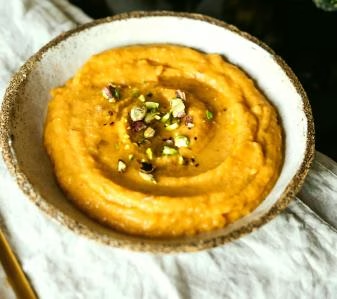Pumpkin’s sweet and warm nature can increase appetite and replenish vital energy, making it perfect for combating the languid heat of autumn.
Pumpkin combats autumn dryness, nourishes the body, and replenishes blood.
Most melons are considered cold in nature, but pumpkin is different. The Compendium of Materia Medica states that pumpkin is warm and sweet, enters the spleen and stomach meridians, and has the function of replenishing vital energy. Pumpkin is also a rich source of beta-carotene, as well as plant protein, carotene, vitamins, essential amino acids, calcium, zinc, iron, cobalt, and phosphorus.
Cobalt helps red blood cells function properly, zinc directly affects the function of mature red blood cells, and iron is an essential trace element for the production of hemoglobin. These nutrients are all excellent blood-tonifying nutrients, making it no wonder that pumpkin was praised by Chen Xiuyuan, a renowned Qing Dynasty physician, as a “miracle blood tonic.”
This pumpkin is packed with nutrients, boasting the highest beta-carotene content among melons.
Pumpkin flesh itself is rich in beta-carotene and vitamin A. If you prefer a nice texture, try eating the pumpkin skin whole, as it contains polyphenols with anti-aging properties.
Pumpkin seeds contain calcium, lecithin, and the mineral zinc, which can boost brain function. Eating pumpkin seeds after middle age can also help prevent benign prostatic hyperplasia (BPH).
While the whole pumpkin is incredibly nutritious, be aware that excessive consumption can promote dampness and heat, making it particularly advisable for those with skin conditions like sores, jaundice, and beriberi.


Leave a Reply